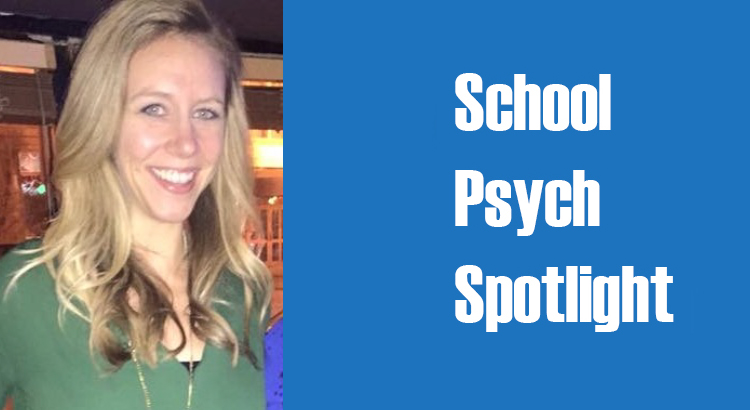Our first School Psychologist Spotlight for this year takes us to the Western edge of the state and Green Hills AEA. Stephanie Dredge started working with Green Hills after graduating from the program at the University of Nebraska at Omaha 4 years ago. Stephanie is originally from Illinois, but transplanted herself to the Omaha in pursuit of her bachelor’s degree at Creighton University. She has made Omaha her home since then. She said, “Omaha has truly become my home and even though the rest of my family resides in the Chicago area I enjoy the easy access between the two locations.”
Her immediate family includes her parents and her older sister, who is a mother to Stephanie’s 2-year-old niece and newborn nephew. She has a stepfamily, as well, who have extended the family with 4 step siblings. When she is not visiting family or gallivanting around the country from DC to Denver visiting friends, she is pursuing her Ed.D in Educational Leadership, which she hopes to complete in the next two years. “My family and friends joke with me that “school” is my hobby since I have been at it nonstop, but what can I say? Learning is one of my greatest joys! Maybe when I have time I will take up baking…. probably not,” wrote Stephanie. She is a self-proclaimed coffee addict and fitness enthusiast, but enjoys a good wine and cheese combination to unwind on the weekends.
As a Green Hills school psychologist, her role has included eligibility evaluations and behavior support. Like other psychs, she also supports special education teachers and consults with them about instructional practices, goal setting for students, and developing appropriate IEPs.
Stephanie is also a CPI and Youth Mental Health First Aid trainer for Green Hills. Additionally, she is the co-lead for the special education representative discipline (These positions include; school psychologists, school consultants, and social workers) within the agency. In this role, she facilitates professional learning teams and works closely with the regional administrators to send a consistent message of the work of special education professionals.
Stephanie is clearly passionate about her work. She enjoys learning, and this field has provided her with daily opportunities for learning. She said about learning, “I value my own knowledge and what I can bring to the table, and I learn so much from the administrators, teachers, and support staff I work with.” She also enjoys the opportunity to make a difference and to impact students. She wrote that the, “impact can look different on any given day, maybe it is working 1:1 with a student, or working with teachers, or helping building administrators change universally. School Psychology is a field in which we can rest assured that we are making a positive difference in our future generations.” Stephanie also mentioned the constant evolution of the field of school psychology as something she enjoys, “It is an ever-changing field, but what stays constant is that my day to day is never dull. It is a more rewarding field than I ever could have imagined since that day I sat in my intro to school psychology class 9 years ago.” When asked if she would change anything about her work, she replied that she would not change much. She appreciates Iowa’s model (not test and place) because she can practice her diverse skill set in the areas of assessment, intervention, and consultation.
“Embrace the chaos,” said Stephanie when asked what advice she would give to new school psychologists. She continued to explain that the chaos is an exciting part of the job. She also has other advice for new school psychs. She encouraged new psychs to be reflective in their practice because, “it will allow for continuous self-growth and improvement.” She also advises new practitioners to develop a network of colleagues for support. She has kept in touch with her graduate school cohort and university professors, and added new colleagues to this support network. Finally, she encouraged us all to give back to field through sharing time and knowledge. She said, “This is not a field we get into for competition of ‘best school psychologist,’ we are in it to make students’ lives, at a minimum, just a little bit better. We need to lean on each other for that.”
